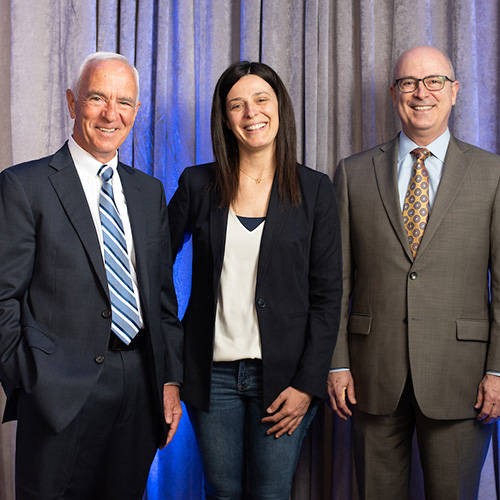An end to one-size-fits-all cancer therapies
In this TED-style talk, learn how JAX is tackling one of the deadliest forms of breast cancer, triple negative breast cancer, from one of our brightest scientists, Francesca Menghi, Ph.D.
The Jackson Laboratory is on the brink of discovering personalized treatments for cancer patients.
At the Cumberland Club in Portland, Maine, JAX Executive Vice President and Chief Operating Officer Charles E. Hewett, Ph.D., shared how the Maine Cancer Genomics Initiative (MCGI) is giving physicians access to the most advanced precision cancer care for their patients.
JAX scientist Francesca Menghi, Ph.D. also discussed how JAX is studying genomic changes in a particularly deadly type of breast cancer.
They spoke at the first event in JAX’s new speaker series, JAXtaposition: Cures Can’t Wait, which features TED-style talks on cutting-edge programs and research from JAX scientists and leaders.
Every patient deserves optimal care
Maine has one of the highest incidences of cancer in the country, with approximately 9,000 new cancer cases each year.
Supported by Harold Alfond Foundation charitable contribution to help improve cancer care in the state of MaineA charitable contribution of $8,410,000 from the Harold Alfond® Foundation will support The Jackson Laboratory’s efforts to enhance cancer diagnostics and treatment in Maine. a grant from the Harold Alfond® Foundation, MCGI is a collaborative effort, led by JAX and involving multiple hospital and healthcare systems and oncology and pathology practices throughout Maine. The aim is to ensure that patients in Maine who have cancer can have access to genomic testing that can be used by their doctors to guide their care with precision.
“We really want every Maine cancer patient to have access to the best cancer care possible,” said Hewett.
JAX works with clinicians from every cancer care provider in Maine to enhance oncology providers’ knowledge of cancer genomic technology and provide access to advanced genomic tests and educational programs to the Maine oncology community. These tests identify mutations that can be targeted by precision medicine treatments.
One of the greatest benefits of MCGI, Hewett said, is the network of oncologists the initiative has brought together from all over the country. MCGI convenes genomic tumor boards, which are groups of experts in cancer genomics, targeted cancer treatments, and genetic counseling who review test results with participating oncologists in Maine and make recommendations about targeted treatments for individual patients. Hewett noted that the genomic tumor boards have been incredibly popular among oncologists and patients.
MCGI was launched last year and as of March of this year, 200 patients have been enrolled, with nearly 90 percent of clinicians across Maine participating.
Finding personalized care for breast cancer patients

Menghi is an associate research scientist in the laboratory of JAX President and CEO Edison T. Liu, M.D. The Liu lab is working to identify better treatments for patients diagnosed with a particularly deadly type of breast cancer, triple-negative breast cancer (TNBC).
TNBC does not respond well to hormonal therapy and patients face a lack of tailored treatment options.
She described the laboratory’s recent study of more than 250 triple-negative breast cancer patients: “What we found was quite surprising. We found that in more than half of these cancers, there was a particular configuration in the genome. These genomes were peppered with hundreds of tandem duplications of DNA segments.”
A tandem duplication is when an identical segment of DNA is copied adjacent to its original segment.
She compared tandem duplications in the genome to a recipe for baking a cake that had been copied from another source, with words or sentence fragments repeated in error: the cake would not be baked properly if baked according to incorrect instructions.
Menghi and her colleagues are now in the process of testing different combinations of treatments on mice with TNBC tumors, in order to find the best treatment for this type of cancer.
“This is a wonderful tool because right now we can classify these mice, put them in groups, and treat them with different treatment options to see which mice respond better than others,” said Menghi.
Ultimately, Menghi said, she and the Liu lab have a vision for personalized care for TNBC patients – for a future with a set of cancer treatments that can work with every type of tumor.